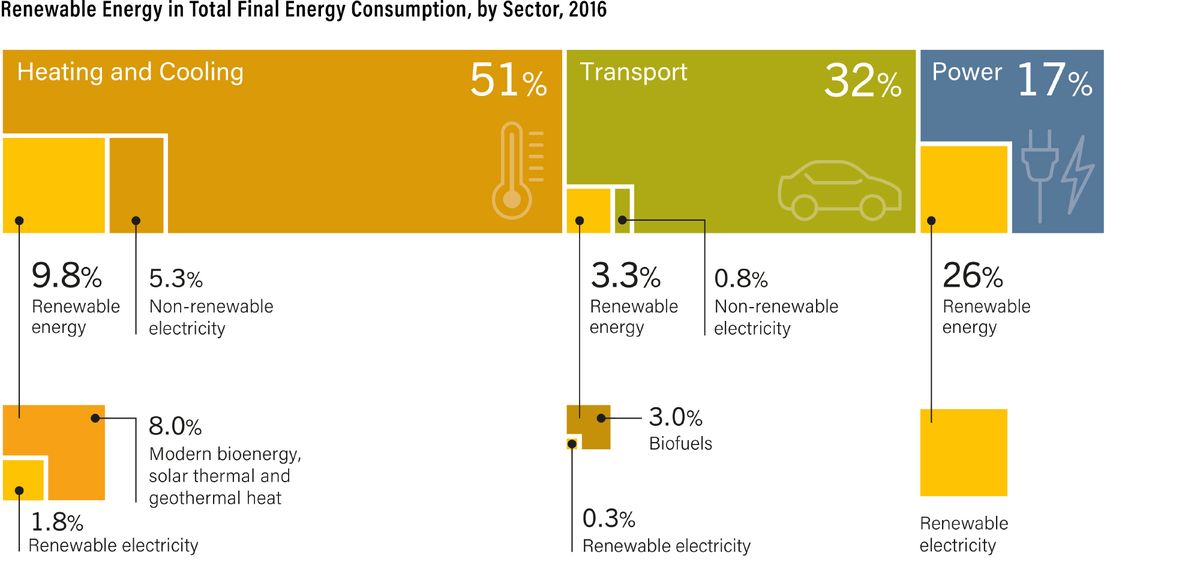
In our collective quest to solve a very important problem, we sometimes miss the proverbial boat. That very thing may be happening with the battle against climate change. In this case I am not talking about climate change denial. That's clearly a problem, but an already well understood one. Instead, I'm talking about a case where those of us who strongly believe in the need to address the climate change problem may also be "missing the boat".
The evidence for this comes in the recently released Renewables 2019 Global Status Report (GSR 2019). It's been published annually for the past 15 years by a think tank called the Renewable Energy Policy Network for the 21st Century, sometimes referred to as REN21.
Like most reports coming out of think tanks, this one is pretty wonky, to the tune of 250+ pages, including heavily footnoted details. According to the organization, its
mandate has been to collect, consolidate and synthesize a vast body of renewable energy data to provide clear and reliable information on what is happening in real time. This mandate still holds today.
Overall, the report shows that we continue to "miss the boat" on reducing carbon emissions worldwide. Despite some important progress, especially with respect to the growth of alternative energy in power generation, global carbon emissions with up 1.7% worldwide during 2018.
It could have been a lot worse. After all, economic growth worldwide was 3.7% last year. Along with that growth came an increase in global energy demand of 2.3%. There are two somewhat positive aspects to this. First, energy demand is growing at a much slower rate than total economic growth, meaning that worldwide energy usage is getting more efficient. Further, carbon emissions went up at less than half the rate of economic growth (1.7% versus 3.7%), another positive. Unfortunately, we've got to find a way to achieve economic growth but someone get total carbon growth to be negative - very negative!
So we continue to "miss the boat" on reducing carbon, something we already know.
The report, however, shows another way we're missing the boat, depicted in the following graphic:

The graphic divides worldwide energy usage into three broad categories - power generation, transportation, and heating and cooling - and shows where the world has been collectively successful in utilizing renewable energy. The greatest success, not surprisingly, has come in power production. After all, solar and wind energy have become very cost competitive worldwide, and an increasing percentage of electric power comes from these sources. That's certainly good news!
What's striking is that 51% of total worldwide energy usage, according to the REN21 authors, is used for heating and cooling. Yet virtually all of the attention has been paid to transport and power generation. The efforts of 7 billion people worldwide to keep warm in cold weather, and to keep cool in hot weather, actually represent more than half of total energy usage. More importantly, they represent a huge part of the greenhouse gas problem.
You already know of the efforts to replace coal fired electric generating plants with wind and solar, and you also know about all of the efforts to switch to electric-powered vehicles. Yet that represents only half of the problem. Why haven't we heard much about the other half? More important, what can we do about it?
As shown in the graphic, 9.8% of heating and cooling worldwide is supplied by renewable energy. Certainly, that's encouraging. What about the balance, which represents 46% of total energy (i.e., 90.2% times 51%)? As noted in the report, its mostly natural gas and oil.
Just as the problem of greenhouse gases in transportation and power generation has created a huge opportunity for entrepreneurs, in the form of solar and wind power, as well as electric vehicles, the same is true for heating and cooling. After all, if the REN21 numbers are correct, there's a huge opportunity to provide heating and cooling using renewables.
The REN21 report notes that, "renewable energy faces certain challenges to growing its share in the heating and cooling sector. Heat supply is highly localized and often is produced directly at the point of demand, such as steam generation in industrial processes or hot water boilers in residential and commercial buildings. As such, firms in the sector operate mainly in local, diverse markets, meaning that a global industry does not exist and that reliable, consolidated data on the heating and cooling sector are largely unavailable. In addition, there are technical challenges to growing shares of renewables in the sector. Thermal energy can occupy a wide range of temperatures and pressures that complicate the pairing of thermal demand with a (renewable) heating or cooling supply. Heat demand also is dispersed over many individual sites, and infrastructure to transport thermal energy is often lacking or uneconomical to construct, especially covering large distances.
Despite these challenges, national and sub-national governments around the world are increasingly acknowledging the urgency of growing the shares of renewables in heating and cooling, although few have taken ambitious steps."
Definitely sounds like an opportunity for an Elon Musk to take on heating and cooling!
As noted in the REN21 report, most heating around the world is powered by natural gas and oil, resulting in lots of greenhouse gases. A good alternative is heat pumps, which have become much more efficient in recent years. A modern heat pump can eliminate fuel oil or natural gas. True, the power requirement for the heat pump may generate some greenhouse gases, if the power source is conventional, but it should be much less of an impact than what it is replacing. Developing ever more energy efficient heat pumps that could replace current heating/cooling sources is an opportunity for big business and budding entrepreneurs alike.
A study done for California utilities shows big potential for heat pumps just in the USA. According to a report by the Department of Energy, heat pumps "offer an energy-efficient alternative to furnaces and air conditioners", but in 2015, they were used in just 10% of American homes. In recent years, improvements in heat pump technology have also made them a "legitimate space heating alternative in colder regions", such as Vermont, according to the DOE.
The question we should be asking is, what would it take to get the 90% of American homes that use some other fuel source - especially those using fuel oil and natural gas - to switch to a high efficiency heat pump? It's one thing to create a highly efficient heat pump useful in North America. What someone needs to do is develop something similar that will be cost effective and at an attractive price point in Africa, Asia, and Latin America.
Besides heat pumps, another opportunity noted in the REN21 report is what are called distributed renewables for energy access (DREA) systems: "These are energy systems that are either stand-alone or off-grid systems, as well as micro- or mini-grids that can generate and distribute energy independently of a centralized electricity grid. DREA systems provide a wide range of services" including lighting, electricity for appliances, cooking, heating and cooling - in both urban and rural areas of the developing world. They can play a key role in fulfilling energy needs and improving the livelihoods of millions of people living in rural and remote parts of the world."
The biggest opportunity for such systems is in places such as Africa and Asia. For example, in Africa, nearly half of the people on the continent, or around 600 million people, lack access to electricity, with the majority living in sub-Saharan Africa.
Here's what I call the next big "landline opportunity."By this I'm referring to the fact that in much of the developing world, the first telephones people have had are mobile phones. They never have had traditional landline phones, managing to skip an entire generation of technology. Instead of building traditional big, centralized power systems to provide heating and cooling, places like sub-Saharan Africa could go directly to DREA systems, especially ones built on renewable technology. All that's needed is the next Mo Ibrahim. Ibrahim is a Sudanese-British billionaire who brought much of mobile telephony to a phoneless Africa.
Another potential area has to do with cooking. Besides heating and cooling of homes and residences, a significant part of the "heating and cooling" use of energy is for cooking. There's a huge opportunity to provide clean energy cooking solutions throughout the world.
Unfortunately, overall the REN21 report paints a fairly gloomy picture. As noted earlier, it points out that the amount of greenhouse gases being dumped into the atmosphere continues to grow, and it identifies a whole range of reasons for it. It correctly notes that things such as huge subsidies around the world to oil and gas are retarding the transition to clean energy.
They're correct. At the same time, they note that these subsidies are spread throughout countries around the world, and it is very difficult to bring change. That may be the case, especially in the short run. All the more reason that attention should be focused on the places where change can occur. To the extent that we spend our time bemoaning things we cannot easily fix, such as eliminating subsidies for oil and gas, we are actually wasting time focusing on the things that can be changed!
It's already obvious that entrepreneurs like Elon Musk have created new technologies that have made renewable power not just a viable option, but even the low cost option, in power generation, even in transport. Now what's needed are entrepreneurs who can extend new technology into the heating and cooling sector. If we don't, we really will be "missing the boat".